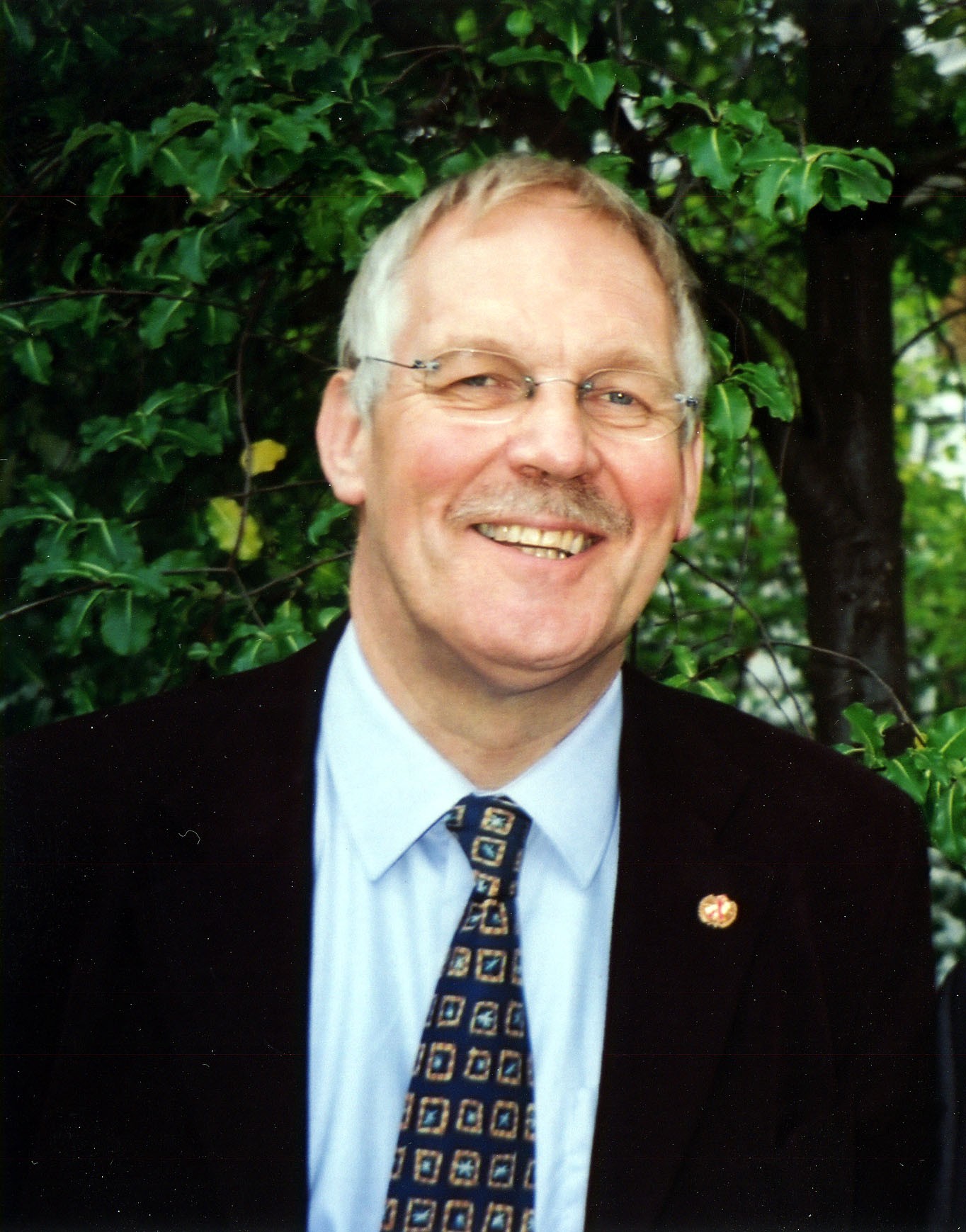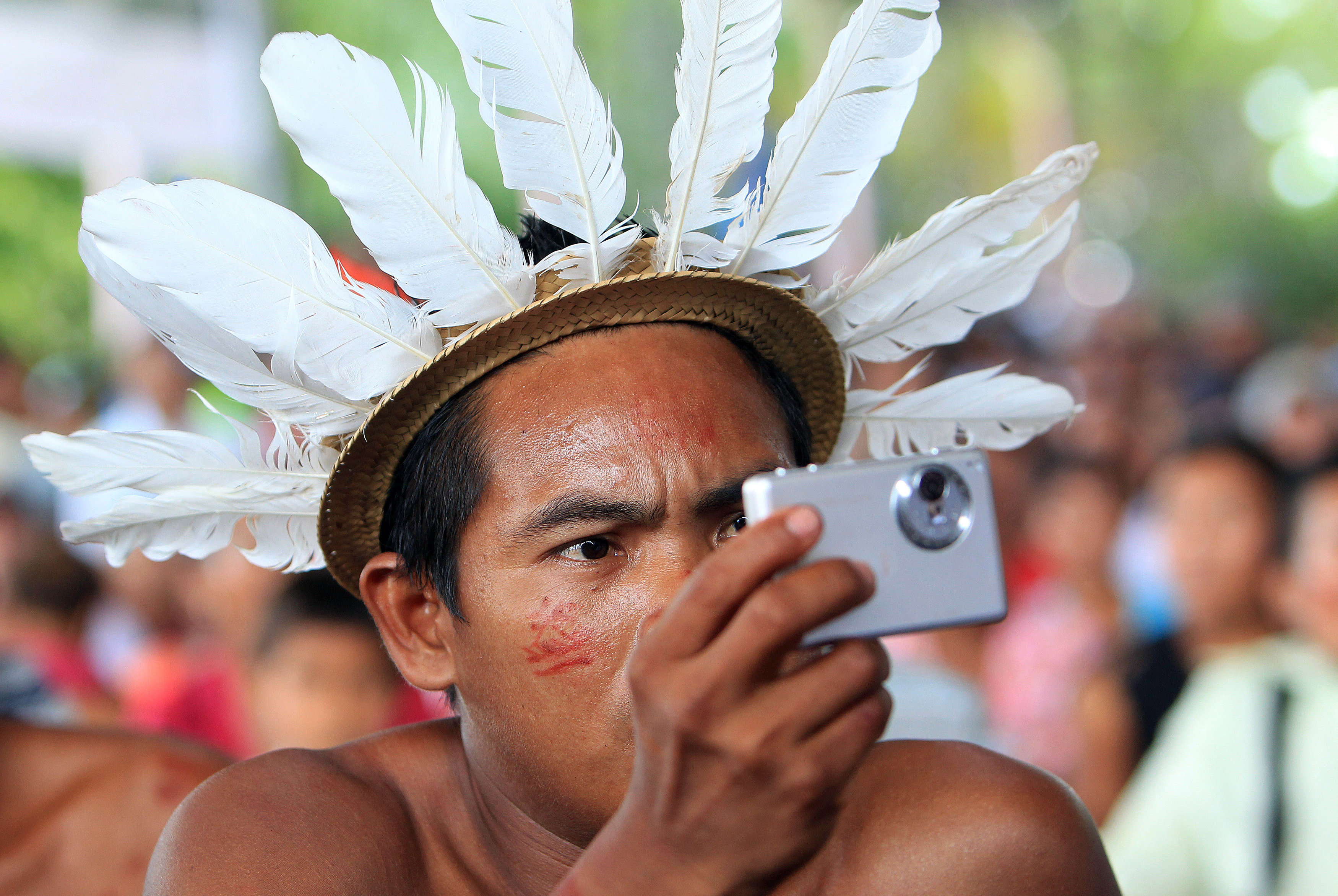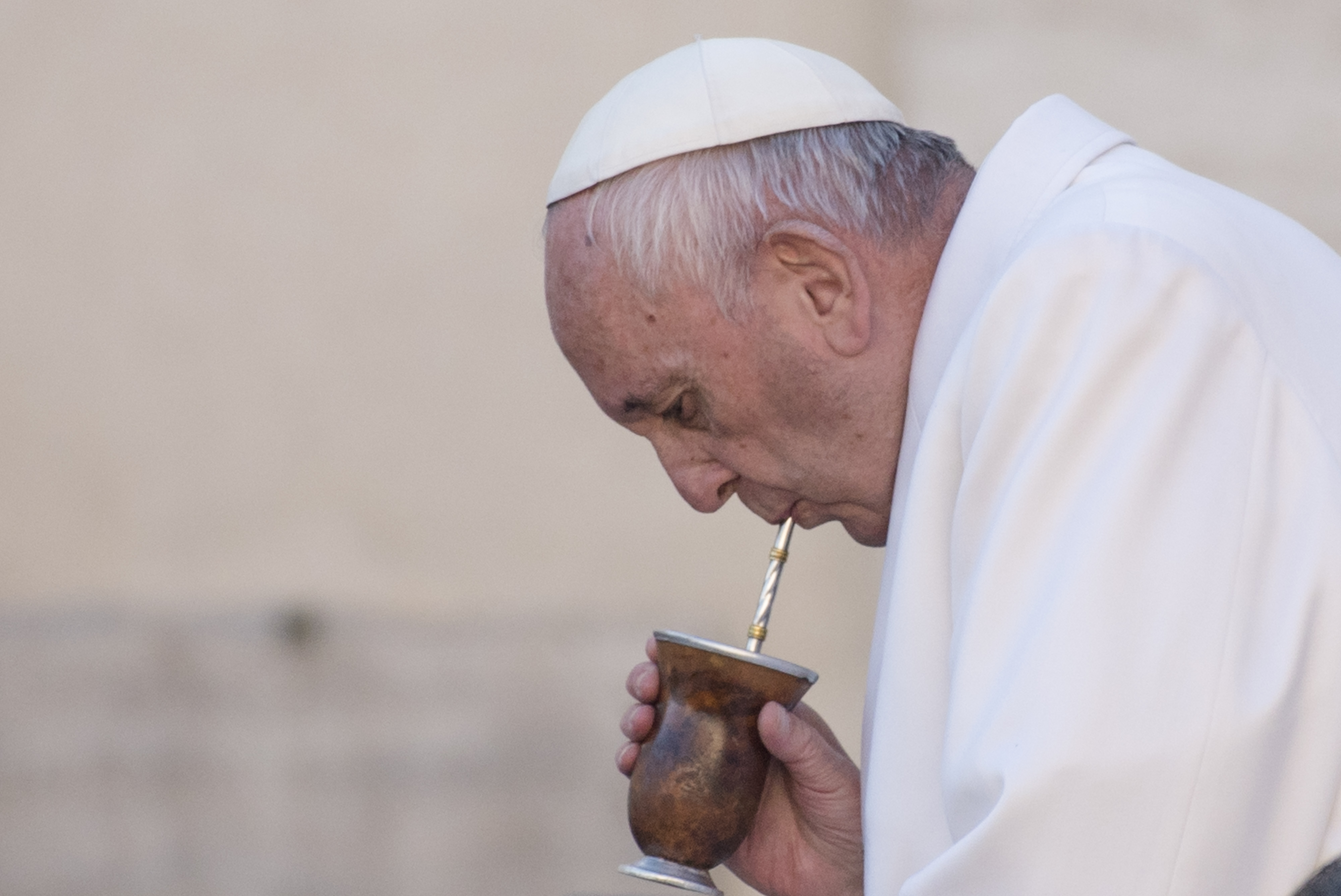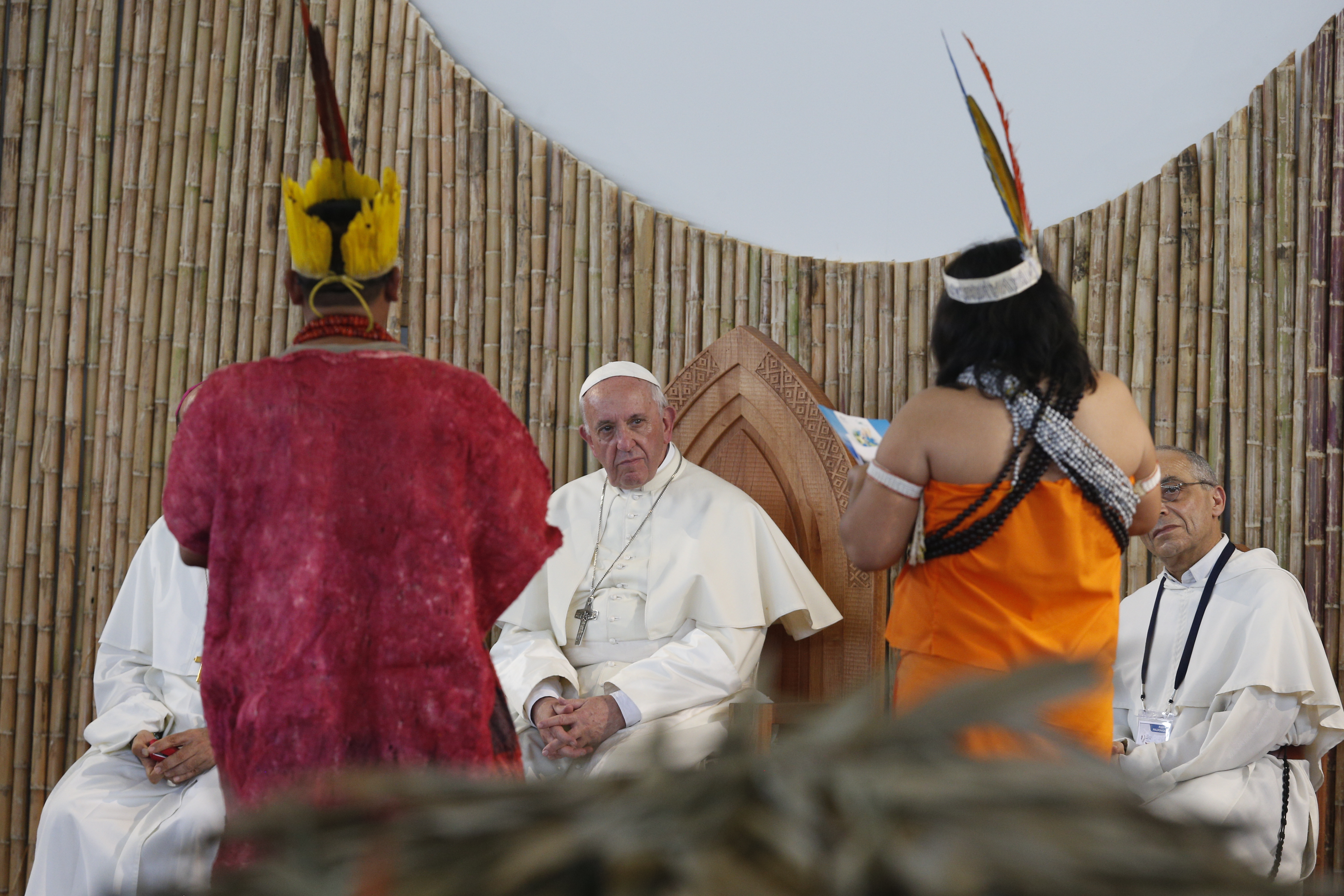 By Julian Filochowski
By Julian Filochowski
Pope Francis brought a message of hope to the Church and to the whole people of Peru. But after a minimum of formalities in Lima, his very first call was to the periphery of the country. It was a joy-filled pilgrimage to Puerto Maldonado, the capital of the Madre de Dios (Mother of God) region of Peru to meet with the Amerindian peoples of Amazonia.
Soon after his plane touched down, the Pope was there in the midst of the throng of indigenous people from the Peruvian rainforest, greeting their leaders and exchanging gifts with them. He listened with great attention to their stories and their witness; he watched their dances in their colourful costumes and heard their songs; and he responded with a hard-hitting prophetic address, picking up many of the concerns they had expressed. The event was superbly choreographed by the local Dominican bishop, David Martinez. But it was not celebrity theatre. Francis interacted with the gathered communities – it was an authentic dialogue.
And very significantly, there in the heart of the rainforest, he fired the starting pistol on the preparations for the Pan-Amazon Synod of Bishops to be held in Rome in 2019. As a guide and interpreter for the English-speaking bishops of the Guyanas, I was a privileged witness to this great encounter of Pope Francis with the native Amazon peoples of Peru, joined by their sisters and brothers from the jungles of neighbouring Bolivia and Brazil. Any lingering stereotypes were dispatched in watching an Amerindian representative with luxuriant feathered headgear pull out an iPhone from under his loincloth to take a picture of the podium party!
In his opening words to the packed Coliseo stadium, Pope Francis named – one by one – 21 different native peoples present. In their faces were reflected the colossal diversity of Amazonia. He said that those of us living outside needed their wisdom and their knowledge to enter in, without destroying the treasures that the region holds. “Praise the Lord for all the biodiversity that these lands embrace."
The Amazon is a land disputed on many fronts. Francis chided "neoextractivism" – reliance by left-leaning Latin American governments on destructive mining activities to finance social reforms – alongside fierce criticism of those big business interests that direct their greed on oil, gas, timber, gold, and agro-industry mono-cultivation in Amazonia. His words were strong, and they were directed far beyond his listeners in Puerto Maldonado. “We have to break the historical paradigm that views Amazonia as an inexhaustible source of supplies for other countries without concern for its inhabitants.”
In the context of proposals for great "Pharaonic" development projects, like dams and highways that affect and can destroy Amerindian lands, Francis underlined that they themselves, whose history is marked by exclusion and discrimination, should be the principal prior dialogue partners. His praise and affirmation were unambiguous. “And if, for some, you are viewed as an obstacle to progress…allow me to state that you are a living memory of the mission that God has entrusted to us all: the protection of our common home.” It was the "Laudato Si" encyclical pithily restated in the context of the Amazon people.
Illegal mining, he declared, leads to another devastating assault on life – human trafficking, slave labour and sexual abuse. “How I wish we would all hear God’s cry – "Where is your brother?" Where is your brother or sister who is enslaved? Let us not pretend and look the other way. There is greater complicity than we think. The issue involves everyone” And again: “The cry of this people is often silenced or not allowed to speak. That prophecy must remain alive in our Church which will never stop pleading for the outcast and those who suffer.” Francis’ message over and again was: Advocacy for the poor yes! Silence, complicity, inaction and resignation – no!
Although it may have caused some minor dismay in governmental quarters and in the board rooms of extractive industries, there is not a scintilla of doubt that the Amazon visit was a stunning success, especially for the Amerindian peoples and for the local Church. It beautifully paves the way to the Pan-Amazon Synod in 2019. As Pope Francis left the auditorium, the chant went up "Francisco, Amigo, La Selva Está Contigo" (Francis, Our Friend, the Forest People Are With You).
His final plea to the gathered communities was: “Help your bishops, and help your men and women missionaries, to shape a Church with an Amazonian face”. This became a key directive to the first Synod preparatory meeting which followed that same afternoon, convened by Cardinal Baldisseri from the Roman Curia, and organised by REPAM (the Panamazonic Ecclesial Network of the Latin American Church).
Bishops from eight countries, along with advisors, met to collect together the baskets of concerns of the Amazon peoples and to list the many and varied pastoral challenges facing the Church across the Amazon basin. Much of this material will eventually be incorporated into the preparatory documentation as the road to the Synod is mapped out. It already seems clear that the principal reference texts will be the encyclicals Laudato Si and Evangelii Gaudium, the conclusions of the 2007 CELAM Conference in Aparecida and, logically, the Pope’s Address delivered there in Puerto Maldonado.
There was a palpable excitement that, through this Synod of Bishops, Pope Francis wants the Amazon periphery, its peoples, their lives, their cultures and their lands, to become a real and serious concern for the whole universal Church. Surely, our only possible response is to echo Francis of Assisi: ‘Laudato Si, O Mi Signore’!
Julian Filochowski is Chair of the Archbishop Romero Trust and Advisor on Latin American Affairs to the British Provincial of the Society of Jesus. In the latter capacity he is assisting the Jesuits in Guyana in their work with the Amerindian peoples of the Rupununi and the Pakaraimas.
Read also: Illari Aragon, programme manager for CAFOD in Peru, explains why the Pope's message must be heard.
(Pics: 1. Pope Francis listens to members of an indigenous group from the Amazon region during a Jan. 19 meeting at Madre de Dios stadium in Puerto Maldonado, Peru. Credit: CNS photo/Paul Haring. 2. An indigenous member of the Desano ethnic group handles a camera during a meeting in Mitu, Colombia, Aug. 19, 2016. Archbishop Salvador Pineiro Garcia-Calderon of Ayacucho, president of the Peruvian bishops' conference, said May 16 that Pope Francis was considering dedicating a meeting of the Synod of Bishops to the concerns of the indigenous people of the Amazon region.)



 Loading ...
Loading ...
What do you think?
You can post as a subscriber user ...
User comments (0)